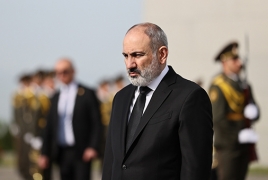
The Lemkin Institute has expressed alarm over Armenian Prime Minister Nikol Pashinyan’s statements “questioning Armenia's legal basis to pursue justice against Turkey” over the Armenian Genocide.
“While we do not generally involve ourselves in domestic affairs of states unless there is an internal threat of genocide, we must address concerns stemming from recent statements made by Armenian Prime Minister Nikol Pashinyan that appear to diverge from fundamental principles of genocide prevention, genocide recognition, and transitional justice, and that directly relate to issues of Armenian national security,” the Institue said in a statement on Friday, May 10.
“We are particularly perplexed and alarmed by aspects of Prime Minister Pashinyan's commemorative statement on 24 April 2024 (Armenian Genocide Remembrance Day), as well as a recent interview with Pashinyan’s associate Hovik Aghazaryan questioning Armenia's legal basis to pursue justice against Türkiye, and discussions led by Civil Contract party member and parliamentarian Andranik Kocharyan about compiling a list of genocide victims.”
The Institue said on 24 April, Armenian Genocide Remembrance Day, the Armenian Prime Minister released an official commemorative statement in which he appears to engage in victim blaming with the purpose of questioning the accountability of Turkey and Azerbaijan for the crime of genocide. His statement further appears to erase the ongoing threats posed to Armenia by Turkey and Azerbaijan by reframing them as the baseless trauma-induced fears within Armenian society. Pashinyan’s apparent agreement with key points in Turkey and Azerbaijan’s denialist narratives as well as his apparent embrace of these countries’ assertions that Armenia is the obstacle to peace in the South Caucasus have met with sustained controversy within the Armenian public.
In one paragraph three, Pashinyan — discussing the period in the Ottoman Empire leading up to the 1915 genocide — said that “...the Armenian people, who had no statehood, had lost their statehood centuries ago, and essentially had forgotten the tradition of statehood, became victims of geopolitical intrigues and false promises, lacking first of all a political mind capable of making the world and its rules understandable.”
“This statement seems to assert that Armenians mysteriously experienced genocide due to their own witlessness. By asserting that Armenians were solely “victims of geopolitical intrigues and false promises,” Pashinyan further disregards the long-term and multi-layered historical oppression of Armenians in the Ottoman Empire as well as the deep and visceral contempt for Armenians among members of the Committee of Union and Progress, the ruling party during the genocide. In other words, Pashinyan’s statement fails to recognize the role played by the ethnic, religious, and cultural animosity for Armenians in the Turkic supremacist campaign of extermination that targeted Armenians during World War I,” the Lemkin Institue said.
“He seems to believe that Armenians brought the genocide upon themselves by misunderstanding the political terrain. Pashinyan’s talking points in this passage seem ironic, given that he has himself embraced Western offers to save Armenia from its hostile neighbors. Yet, his talking points also echo the official position of Turkey regarding the Armenian Genocide which justified it by contracting “against an onslaught of external invaders and internal nationalist independence movements”. By parroting the Turkish narrative of the events of 1915-1923, the Armenian Prime Minister risks absolving Turkey of its responsibility for the Armenian Genocide, downplaying all previous acknowledgment efforts. Further, it may substantially hamper the continuing work on international recognition of the Armenian Genocide and Turkish accountability - something that the worldwide Armenian diaspora, as well as genocide scholars and activists, have been fighting for.
The Institue believes that Pashinyan’s argument that “Armenian people, who had no statehood, had lost their statehood centuries ago, and essentially had forgotten the tradition of statehood” inexplicably plays into the denialist agenda of Turkey and Azerbaijan by obliquely mischaracterizing Armenian efforts to gain equal rights and human security in the Ottoman empire with foolish attempts to exercise a quest for independent statehood for which they had no capacity.
“Pashinyan bears responsibility for any statements that deny or downplay the Armenian Genocide, as they not only jeopardize the painstaking efforts to secure its recognition, but also establish a dangerous precedent for the whitewashing of such atrocities amid a shifting geopolitical landscape that is threatening Armenian sovereignty,” the Institue said.
“As an organization dedicated to genocide prevention and the promotion of accountability and justice, we urge Prime Minister Pashinyan to reconsider his statements and reaffirm Armenia's commitment to pursuing justice for the Armenian Genocide.”

